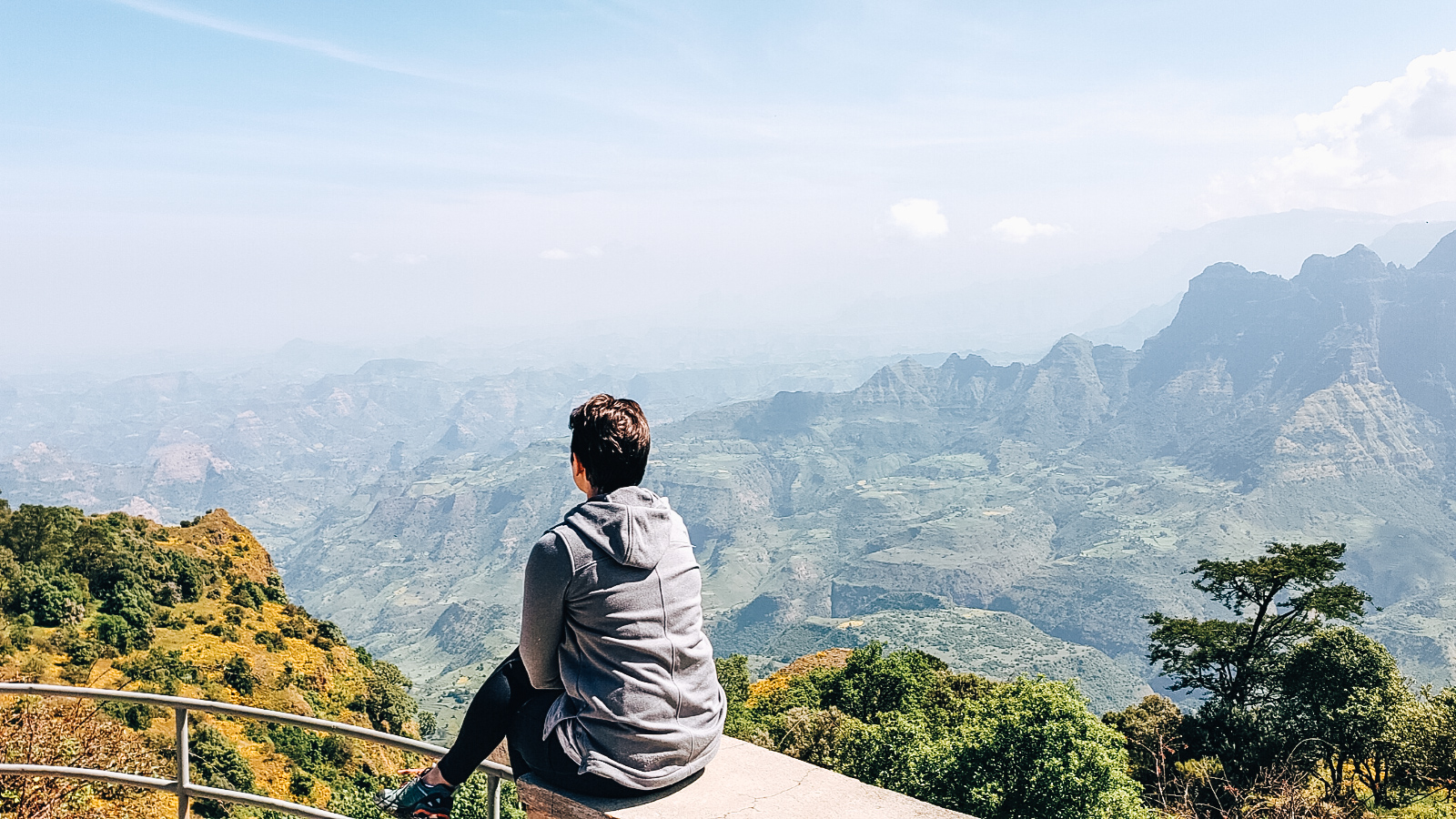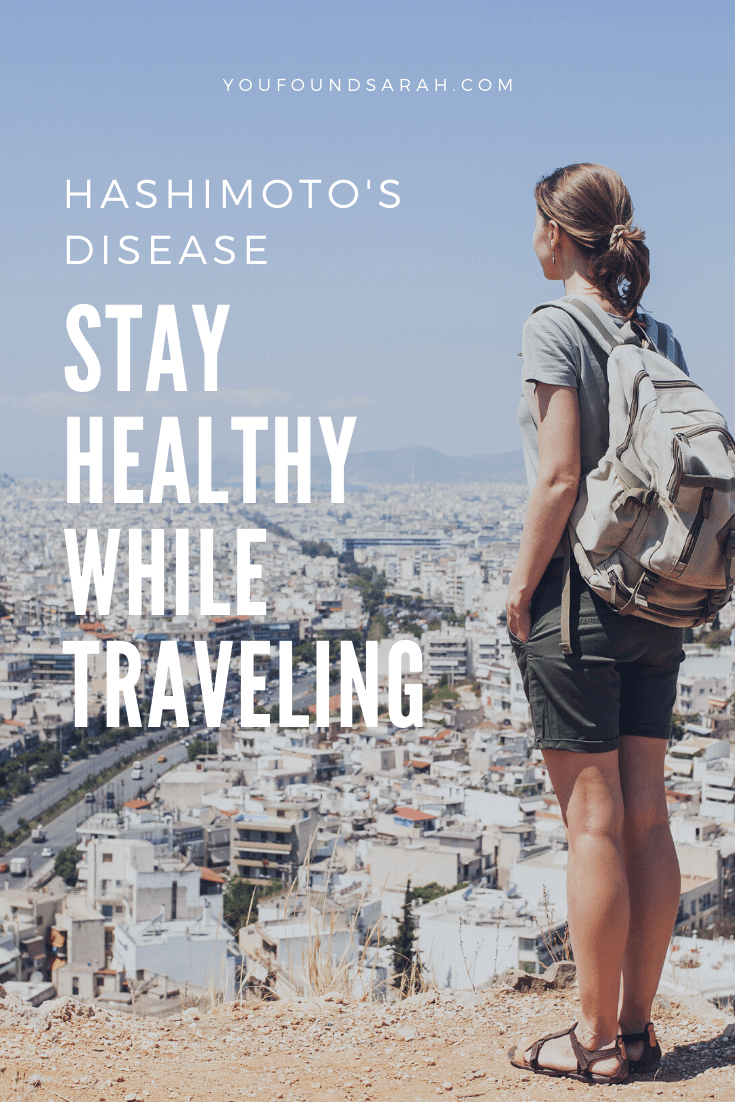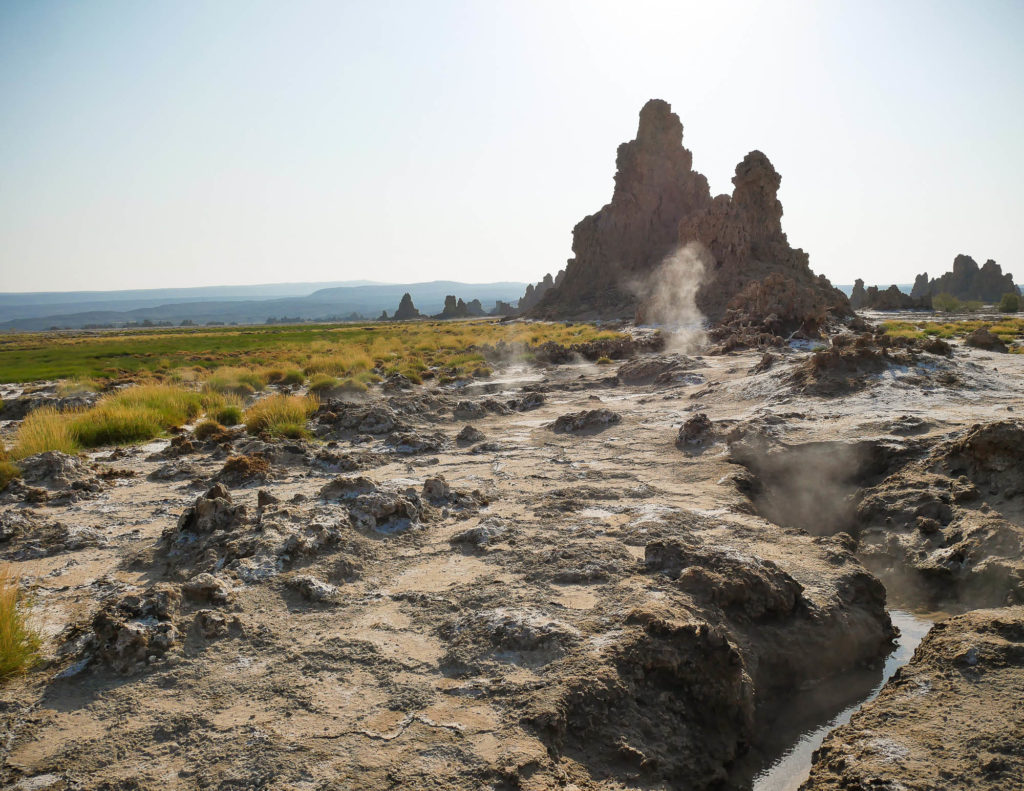24 Feb How to Stay Healthy While Traveling with Hashimoto’s

How to Stay Healthy While Traveling with Hashimoto’s
Disclosure: This post may contain affiliate links that, at no cost to you, may earn me a small commission. I only recommend products I would use myself and all opinions expressed here are our own. Read my full disclosure policy.
Traveling after being diagnosed with an autoimmune disease like Hashimoto’s can seem daunting. But don’t put up that passport just yet! With the right expectations and preparations, you’ll cross places off your bucket list in no time.
My Journey to Diagnosis
When I was first diagnosed with Hashimoto’s disease, I was the most stressed out of any point in my life. The year prior I’d ended a bad relationship, found my husband, and learned that my sweet dog was dying. In 2011, I left one job in a blaze of glory, started a new career, and laid my dog to rest. I was up before dawn, worked all day, and then stayed up late enjoying my new relationship.
Until I couldn’t stay up anymore. Like, literally. I could – not – stay – awake.
I started sleeping more, but no matter how many hours of sleep I got, it was never enough. If I sat, I slept.
Then my hair started falling out by the fistfuls, my skin got these weird scaly patches, and I gained weight — so much weight. I couldn’t seem to concentrate. A few years before I was finishing my master’s degree at Vanderbilt University, and now I didn’t feel like I could sit through a one-hour meeting.
Everything felt wrong about my body. I had this feeling of simply being unwell.
You know your body and you should trust those feelings.
As I read other people’s journeys to get a diagnosis with autoimmune conditions, I feel really lucky. So many people go looking for answers to why they feel so tired or can’t lose weight and are bounced around from physician to physician.
Luckily, my physician examined my thyroid and felt nodules immediately. A blood test confirmed what he suspected, Hashimoto’s disease. (If you have questions about Hashimoto’s or getting a diagnosis, please feel free to reach out!)
Table of Contents
What is Hashimoto’s Disease?
Hashi’s is an autoimmune disease that attacks the thyroid gland. The way that I understand it best is that all of a sudden my body was sent into fight or flight overdrive (something like an extremely stressful period of life can start this) from which I never really recovered.
Then my immune system decided that something, in Hashi’s case the thyroid, was a foreign “enemy” and it sought to destroy it.
Our thyroid is responsible for so many “life” things: metabolism, energy, growth (hair, nails, bones), stress management (in partnership with adrenal glands), muscle strength and joints, brain function, etc.
Meghan O’Rourke’s piece for the New York Times is very similar to what I, and many others, experienced before finding help. If you are suffering from Hashi’s, or know someone who is, give this a read.
It’s my hope that by writing this, others who are suffering from autoimmune conditions or adrenal fatigue can be inspired to get out and explore the world. But first, I hope that you’ve found the right doctor and medications and that you are pursuing a healthy diet.
Travel is stressful for everyone (though I believe that is why it’s so memorable!), but it is especially stressful when you have a chronic illness or other health concerns to content with.
Here is a list of the items that keep my Hashimoto’s symptoms in check at home and when I’m traveling.
Traveling with Hashimoto's Disease
Medications
>> Always pack them in your carry on, never in your checked bag. Check out this post on the other items you should never forget to pack in your carry-on bag!
>> Bring more of your medication than you think you’ll need for your trip. If you’ll be away for nine days, back enough medication for 13. This will accommodate for flight or other transportation delays or if you lose your pills or they get stolen.
>> Take a picture of your pill bottle (capture the medication name, dosage as well as your name). This will help you talk to a pharmacist about your medication needs in case something happens while you’re traveling.
For international travel, don't plan on purchasing more medication while you're there, since medication standards may be different than those in the United States. If you need more than a 30-day supply, talk to your doctor and/or pharmacy about getting a prescription that allows for extra medication for your trip.
Very Well Health
Figure Out a Medication Schedule
When you have an autoimmune condition like Hashimoto’s Disease, it is so important that you take your medications on a pretty strict schedule.
I asked my endocrinologist about how to handle my medication schedule before I traveled the first time following my Hashimoto’s diagnosis.
He told me to continue my normal schedule until I arrived at my destination. Then, once landed, I should get on the schedule of the local time zone. That’s because it is so important to take medications on an empty stomach. In addition, the half-life (how long the medication stays in your body after the last pill you take) Levothyroxine means that the pills stay active in your body for many days even after you quit taking them.
Sleep Often
Sleep is so important with chronic illnesses like Hashimoto’s and traveling can really disrupt your normal cycles. I used to think about my destination’s time zone and either stay awake or sleep on flights. But now I just sleep as much as I can.
If you’re tired, pop on that eye mask, put in those earplugs, and snooze away.
Get TSA Pre-Check
This might sound weird like a weird tip, but hear me out. We all know that stress is terrible for Hashimoto’s and other autoimmune diseases, and there’s nothing more stressful than traveling and dealing with TSA.
Getting Pre-Check helps cut down on some of the hassles of traveling; for example, you don’t need to remove your shoes or take out your electronics or travel-sized liquids.
Get Up, Walk Around, and Stretch
This is helpful for anyone on long flights, but I like to get up every two hours just to stretch my joints and get some blood pumping.
>> While you’re binge-watching The Good Place, do ankle circles to get those calves moving, stretch out your back by arching backward and rounding forwards, and stretch out your neck and upper back by putting your chin to your chest and then circling it around. Doing this can help prevent any muscle or joint pain that is exacerbated by thyroid disease as well as prevent DVT blood clots.
>> Don’t forget to wear compression socks! I wear them anytime I’m on a flight that is four hours or longer.
Think Moisture
Cabin air is notoriously dry and can exacerbate the dry hair, skin, and eyes that people with autoimmune diseases already deal with every day.
>> Bring along some emollient lotion and some good lip balm. This lanolin cream works double duty!
>> Wear glasses instead of contacts during the flight.
>> Use lubricating eye drops.
>> If your nose or sinuses get dried out, bring along a travel-friendly saline nose spray.
Protect Your Immune System
Having an autoimmune disease like Hashimoto’s makes you more susceptible to picking up infections while traveling. And, as you can imagine, breathing the same recycled air as everyone else on the plane doesn’t lend itself to the best illness prevention. Here are some tips to avoid germs while traveling:
>> Don’t use airline-provided blankets or pillows. Yes, even if they’re sealed. Here is a really cute, travel-friendly blanket that preforms double duty as a beach blanket and towel, and my favorite travel pillow.
>> Avoid drinking water that comes from the plane (bottled water that is poured is okay); this includes coffee and tea. Water on planes is stored in tanks that are cleaned infrequently, and bacteria have regularly been found by the U.S. Environmental Protection Agency.
Supplements & Vitamins
>> A high-quality women’s multivitamin with selenium.
>> Melatonin. Melatonin can help you beat that jet lag (and maybe just prevent it altogether!), adjust to time zone changes, and reset your internal clock. If you arrive during the day, do not sleep or nap until bedtime. Take 3-5 mgs of melatonin one hour before heading to bed to kickstart your circadian rhythm.
>> Magnesium Citrate. Magnesium citrate aids in a sense of calm (getting stressed is terrible for autoimmune conditions) and that your bowels are moving properly.
Stay Hydrated
I bring a stainless steel reusable water bottle with me on the flight and sometimes I even buy another bottle of water prior to boarding. I used to love the convenience of the collapsable versions for traveling, but I love how cold the steel water bottles keep my water. So refreshing!
>> Avoid alcohol and caffeinated beverages because they can dehydrate you. Plain old water and fruit juices are the best way to go.
Dress In Layers
I get so cold, especially my extremities, because of my thyroid disease. If you experience cold intolerance as a result of your autoimmune disease, dress in light, easy-to-remove layers so that you can be comfortable no matter the temperature. I love traveling in a shawl like this one.
Come Prepared With Snacks!
With Hashimoto’s disease, I feel the best when I adhere to a Paleo or autoimmune Paleo (AIP) diet — especially when traveling. Here are some snacks that will satisfy — and keep you from eating the not-so-friendly food served on airplanes.
- Paleo Angel Power Balls
- Granola Bakery – Coconut Cashew Paleo Granola
- Nick’s Sticks 100% Grass-Fed Beef Snack Sticks
- Performance Nut Butter Macadamia, Coconut and Cashew Nut Butter
- RXBAR, Chocolate Sea Salt, Protein Bar
- CHOMPS Grass Fed Beef Jerky Meat Snack Sticks
- Dang Keto Toasted Coconut Chips
- Larabar
- Manitoba Harvest Hemp Yeah! Bars
RESOURCES TO HELP YOUR TRAVELS
As always, everything on this site is completely free. If you found this post (or anything on YouFoundSarah) useful, I’d be grateful if you considered using the affiliate links below. I make a small commission at no extra cost to you. These are the services Drew and I love to use ourselves when we plan our travel. Thanks for your support! — Sarah
Booking.com – For booking hotel rooms.
Tours by Locals and GetYourGuide.com – For finding high-quality tours around the world.
Airbnb.com – For booking unique apartments and homes.
Save this to Pinterest
Where are you traveling next?
Welcome to You Found Sarah! We’re exploring the world — one country at a time. Read more…
Reader Favorites













No Comments